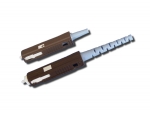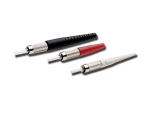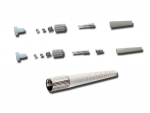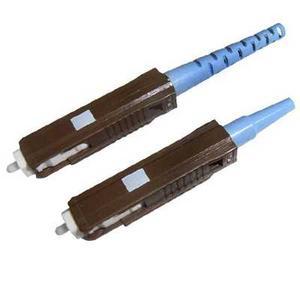MU/D4/DIN Fiber Connector
Optic fiber connector is one of the most basic components in optical fiber
communications system. The earliest few types including FC, SC and MU were
developed by NTT in Japan and the Germany designed DIN 47256 type. In order to
reduce footprint, Bell Labs developed the LC type with a small volume to save
space. With rapid advances in fiber optic technology over the past decades,
these connectors have gained widespread popularity in the world.



Benefits
1. Corrosion resistant and durable
2. Low insertion loss
3. Ceramic, metal and plastic ferrules are available.
4. Different models offer various kinds of tail sleeves and colors.
5. SC and LC type connector can be equipped with a tail sleeve bent at 45 or 90
degrees.
6. Mechanical properties of SC/FC type meet standards of IEC 874-7 and CECC
86115-80.
7. Mechanical properties of SC type conform to EN 50173 and EIA-568-A standards.
8. ST type is compliant with IEC 874-10, CECC BFOC/2.5 and AT&T-STII standards.
9. Mechanical properties of LC type complies with IEC 11801, EIA 568A and
FOCIS10 standards.
10. Mechanical properties of MU type are in accordance with IEC 61754-6 and JIS
C5983 standards.
Applications
1. Through curing and grinding processes, the fiber connector, along with
various fibers, can be made into different kinds of patch cords and pigtails.
2. Optical fiber communication system, active devices and optical fiber sensors
3. Communication machine rooms
4. FTTH
5. Transmission equipment of fiber-optic link and national defense equipment
6. LANs and WANs
7. Telecommunication network and CATV
8. System debugging
Applicable Standards
Design and test of all the products conform to many standards including IEC
60874-7, CECC 86115-801, Bellcore/Telcordia GR-326, EIA/TIA 604-3A, EIA/TIA 568,
ISO/IEC 11801 2nd Ed., EN 50173, JIS C5973 F04, ICEA-596, IEC60793-2-10 A1a,
ITU-T G.651 or IEC60793-2-10 A1b or ITU-T G.652 ( based on fiber type),
Belcore/Telcordia GR-409-CORE, IEC 793, IEC 794-1-E1, IEC 794-1-E3, UL1666/901
(UL-cable) and EIA/TIA455.
Optional Types
Connector kit and components for connectors are all available.
Structure of Optic Fiber Connector
Specifications
Parameter Specifications
Connector Type SC,LC,FC,ST,MU,D4,DIN
Fiber Type Single mode Multimode
Testing Wavelength 1,310nm, 1,550nm 850nm, ,1300nm
Insertion Loss Typical≤0.20dB, max.≤0.30dB Typical≤0.15dB, max.≤0.25dB
Return Loss UPC ≥50.0dB,APC ≥60.0dB ≥35.0dB
Durability Mating 1,000, typical≤0.20dB
Fiber External Diameter ∮ 0.9mm / ∮ 1.8mm & ∮ 2.0mm / ∮ 3.0mm ( Only for
MU:∮ 0.9mm / ∮ 2.0mm )
Ferrule External Diameter ∮ 2.5mm :SC, FC,ST,DIN; ∮ 2.0mm :D4; ∮ 1.25mm
:LC,MU
Degree of Tail Sleeve SC,LC(45 or 90 degrees)
Operating Temperature -20℃ to +70℃
Storage Temperature - 40℃ to +85℃
Ferrule Size Pore size:125.3+1/-0μm, concentricity≤1.0μm Pore
size:127+3/-0μm, concentricity≤3.0μm





